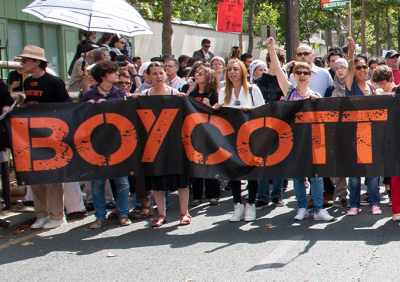Prejudiced President, Pliant Republican Party: Return of the Boycott as Political Resistance

How can the American public push back on its brash and prejudiced president while a pliant Republican party in control of the U.S. Congress seems in no mood to oppose their new leader?
Workers’ strikes may be effective in some countries. But in America striking is a tool of the distant past. Workers syndicates, with the possible exception of police unions, are hardly extant in the 21st century.
Boycott is an option, but generally not a very effective political instrument where people are too attached to their pleasures and habits, whether sugary drinks, big cars, online shopping, dining or holidaying. (I admit that I myself am facing difficulty—thus far I’m managing—sustaining my boycott of SNL because of Katie Rich’s nasty remark about Trump’s young son.)
But we’re in a new era, aren’t we? A new ball game, where the immediate target of boycott would be very precise, a mortal, and a businessman. A perfect prey. No need to appeal to ethics or justice, when the strategy is to vote with one’s wallet against Trump family enterprises. No court decisions are needed, no mass signatures, no parades at the gates of Trump properties.
Consumers can simply stop buying, and there’s plenty to strike off the shopping list, starting with Ivanka Trump’s fashion and jewelry products—carried in upscale stores like Nieman Marcus and Saks and by peoples’ retailers Walmarts and Amazon. (A boycott that overrides class distinctions). From reports of markdowns in store this week, the action, initiated by #grabyourwallet seems well underway. https://grabyourwallet.org/ Boycott%20These%20Companies. html.
But wait. Ivanka’s shoe line is the glamorous surface of this movement. Forget about quarterback Brady’s friendship with Trump, and discover an underworld of millions of possible boycotters. I’m talking about academics—an almost invisible and, dare I say, politically conservative American (liberal) population. Our scientists and academics, if they are mad enough and can summon their courage to boycott, could make a tremendous impact. Unexpectedly, tens of thousands have already signed on to what’s become a tsunami wave to challenge Trump’s Muslim ban. University staff, hospital administrators, researchers and professors in all fields of scholarship and science are publicly acknowledging the millions of women and men in their labs, their lecture halls, their conferences and panels, and their classrooms who are recent or settled immigrants, visiting students, invited professors, co-authors—all foreign born, many of them Muslim– on special visas or with green cards.
In response to President Trumps travel ban, two major academic boycotts are underway: a Canadian boycott with over 4000 signatories arose on the heels of another initiated in the UK with over 42,000 supporters. All are refusing to attend any professional conferences in the USA. To start.
Academic conferences? you inquire smugly. We need millions of plebeians in the streets to make any impact, you claim.
I give street protests their due; they’re essential in demonstrating the reach and depth of public resistance. But don’t sniff at conferences. Hotels thrive on them, yes. But so do our professors, graduate students, the entire research community, and the economy.
Academic conferences are where new graduates seek employment, where scholars present research findings and authors hunt for publishers, where accolades are awarded and new leaders are identified, where alumni meet and reaffirm their college’s reputation, where professional networks are strengthened and expanded. These conferences are huge events. Take my field of anthropology for example.
As a U. K. graduate we had a community of barely 300 anthropologists in the 1980s. So I was overwhelmed on my initial visit to the U.S., attending the annual AAA (American Anthropological Association) conference, to find myself among 3,300 fellow researchers. (Today that figure is double.) Besides nation-wide conferences, each profession has regional gatherings and state forums. Multiply this by all the professions, from neurology to modern Chinese literature, paleontology to copyright law, and you begin to grasp the scale of this low-keyed professional world.
Conferences are essential to academic growth, to career advancement, to intellectual competition and exchange, events eagerly anticipated year after year. Yet tens of thousands are ready to forego them in support of their ‘foreign’ colleagues. This is serious.
These scientists know how essential ‘foreigners’ are to their own successes, to rigorous intellectual dialogue, and to America’s global cultural and scientific influence. Those foreign students joining research teams win accolades and grants for their departments, many staying on permanently. Visiting professors are welcomed, feted, and often offered permanent jobs in the U.S. The high quality education and love of learning that Egyptians, Indians, Iraqis, Iranians, Pakistanis, Palestinians, Sudanese, and Syrians bring from their homelands are coveted by U.S. research laboratories, colleges and institutes.
Perusing the 2013 American National Science Foundation survey we can measure the prominence of immigrants. For example, between 2003 and 2013, of 341,000 immigrant scientists and engineers, more than half, 1,873,000, originated in Asia—Far East, Southeast and South Asia, and ‘other’– likely West Asia/Middle East. (Compare with 632,000 from Europe, and 179,000 from South America.)
Of 21,000,000 scientists and engineers, 15.6 percent are non-native born. Over 80 percent of immigrant scholars enter computer and math sciences, increasingly important fields in our economy.
Engaging in an academic boycott is a real social, political and economic sacrifice. It’s neither common nor easy, as attested in the long, uphill of the academic boycott of Israel. Older professors recall their successful boycott of South Africa (1965-1990), part of the global Anti-Apartheid movement, 50 years ago with nostalgia, partly because of its exceptionality. So today’s boycott against Trump’s policies represents a historical breakthrough.
The lists are growing daily, the most recent being the boycott by an American NGO, a Minnesota nonprofit serving Somali-American youth.
Over barely two weeks, public boycotts are matching a fortnight of presidential decrees. “We’re making history.”

